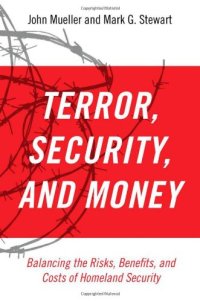
Ebook: Terror, Security, and Money: Balancing the Risks, Benefits, and Costs of Homeland Security
Author: John Mueller Mark G. Stewart
- Tags: Civil Environmental Acoustics Bridges Earthwork Design Fire Science Highway Traffic Hydrology Remote Sensing Seismic Structural Dynamics Surveying Photogrammetry Transportation Engineering Technology Math National International Security Specific Topics Politics Government Social Sciences Public Affairs Administration Policy New Used Rental Textbooks Specialty Boutique Political
- Year: 2011
- Publisher: Oxford University Press
- Edition: 1
- Language: English
- pdf
In seeking to evaluate the efficacy of post-9/11 homeland security expenses--which have risen by more than a trillion dollars, not including war costs--the common query has been, "Are we safer?" This, however, is the wrong question. Of course we are "safer"--the posting of a single security guard at one building's entrance enhances safety. The correct question is, "Are any gains in security worth the funds expended?"
In this engaging, readable book, John Mueller and Mark Stewart apply risk and cost-benefit evaluation techniques to answer this very question. This analytical approach has been used throughout the world for decades by regulators, academics, and businesses--but, as a recent National Academy of Science study suggests, it has never been capably applied by the people administering homeland security funds. Given the limited risk terrorism presents, expenses meant to lower it have for the most part simply not been worth it. For example, to be considered cost-effective, increased American homeland security expenditures would have had each year to have foiled up to 1,667 attacks roughly like the one intended on Times Square in 2010--more than four a day. Cataloging the mistakes that the US has made--and continues to make--in managing homeland security programs, Terror, Security, and Money has the potential to redirect our efforts toward a more productive and far more cost-effective course.
In this engaging, readable book, John Mueller and Mark Stewart apply risk and cost-benefit evaluation techniques to answer this very question. This analytical approach has been used throughout the world for decades by regulators, academics, and businesses--but, as a recent National Academy of Science study suggests, it has never been capably applied by the people administering homeland security funds. Given the limited risk terrorism presents, expenses meant to lower it have for the most part simply not been worth it. For example, to be considered cost-effective, increased American homeland security expenditures would have had each year to have foiled up to 1,667 attacks roughly like the one intended on Times Square in 2010--more than four a day. Cataloging the mistakes that the US has made--and continues to make--in managing homeland security programs, Terror, Security, and Money has the potential to redirect our efforts toward a more productive and far more cost-effective course.
Download the book Terror, Security, and Money: Balancing the Risks, Benefits, and Costs of Homeland Security for free or read online
Continue reading on any device:

Last viewed books
Related books
{related-news}
Comments (0)